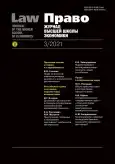Specialized State Courts — a Relevant Forum for Resolving International Commercial Disputes
- 作者: Schukin A.1
-
隶属关系:
- Department of Private International Law, Institute of Legislation and Comparative Law under the Government of the Russian Federation
- 期: 卷 14, 编号 3 (2021)
- 页面: 175-207
- 栏目: Law in the Modern World
- URL: https://journal-vniispk.ru/2072-8166/article/view/318120
- DOI: https://doi.org/10.17323/2072-8166.2021.3.175.207
- ID: 318120
如何引用文章
全文:
详细
作者简介
Andrey Schukin
Department of Private International Law, Institute of Legislation and Comparative Law under the Government of the Russian Federation
Email: noreply@hse.ru
Leading Researcher, Candidate of Juridical Sciences
参考
- Hess B. (2017) The Justice Initiative Frankfurt am Main. Available at:http://conflictoflaws.net/2017/the-justice-initiative-frankfurt-am-main-2017-law-made-in-frankfurt/(дата обращения: 30.03.2021)
- Isidro M. (2020) New Courts for International Commercial Disputes in Germany. Available at:https://eapil.org/2020/11/23/new-courts-for-international-commercial-disputes-in-germany/comment-page-1/(дата обращения: 30.03.2021)
- Thomas J. (2017) Keeping Commercial Law Up to Date. Available at:https://www.judi-ciary.uk/wp-content/uploads/2017/05/lcj-aston-university-speech-8-march-2017.pdf(дата обращения: 30.03.2021)
- Bauw E. (2019) Commercial Litigation in Europe in Transformation: The Case of the Netherlands Commercial Court. Erasmus Law Review, vol. 12, no 1, pp. 15-23.
- Bechtold S., Frankenreiter J., Klerman D. (2019) Forum Selling Abroad. Southern California Law Review, vol. 92, no 3, pp. 487-556.
- Blair W. (2019) The New Litigation Landscape: International Commercial Courts and Procedural Innovations. International Journal of Procedural Law, no 2, pp. 212-234.
- Get'man-Pavlova I.V., Kasatkina A.S., Filatova M.A. (2017) The International civil procedure. Moscow: Yurait, 271 p. (in Russian)
- Gramckow H., Walsh B. (2013) Developing Specialized Court Services: International Experiences and Lessons Learned.
- Hess B., Boerner T. (2019) Chambers for International Commercial Disputes in Germany: The State of Affairs. Erasmus Law Review, vol. 12, no 1, pp. 33-41.
- Huo Z., Yip M. (2019) Comparing the International Commercial Courts of China with the Singapore International Commercial Court. International and Comparative Law Quarterly, vol. 68, issue 4, pp. 903-942.
- Katz J. (2012) Access to Justice from the Perspective of the Commercial Community: Judicial Specialization. Auckland University Law Review, vol. 18, pp. 37-46.
- Khabrieva T.Y., Doronina N.G. (2011) Legal prerequisites for the creation of an international financial center in Russia. International financial center in Russia: economic problems and legal solutions. Moscow: Delo, pp. 253-274 (in Russian)
- Kramer X., Sorabji J. (2019) International Business Courts in Europe and Beyond: A Global Competition for Justice? Erasmus Law Review, vol. 12, no 1, pp. 1-9.
- Ostrager B. (2020) New York's Commercial Division: The Premier Forum for the Resolution of International Business Disputes. New York State Bar Journal, no 4, pp. 16-19.
- Rowan S. (2017) The New French Law of Contract. International and Comparative Law Quarterly, vol. 66, no 4, pp. 805-832.
- Sharar Z. (2020) A Comparative Guide to the Proceedings of a Case in the Qatar International Court and in the Qatar National Courts. Qatar Business Law Review, no 2, pp. 34-37.
- Silvestri E. (2014) Judicial Specialization: in Search of the ‘Right' Judge for Each Case? Russian Law Journal, issue 4, pp. 165-175.
- Steel W. (2015) Judicial Specialization in a Generalist Jurisdiction: Is Commercial Specialization within the High Court Justified? Victoria University of Wellington Law Review, vol. 46, pp. 307-360.
- Themeli E. (2018) The Great Race of Courts: Civil Justice System Competition in the European Union. Doctoral Thesis. Rotterdam, 441 p.
- Themeli E. (2019) Matchmaking International Commercial Courts and Lawyers' Preferences in Europe. Erasmus Law Review, vol. 12, no 1, pp. 70-81.
- Walker J. (2019) Specialized International Courts: Keeping Arbitration on Top of its Game. International Journal of Arbitration, Mediation and Dispute Management, vol. 85, no 1, pp. 2-23.
- Woolf G. (2019) A Vision of the AIFC Court. Nur-Sultan: AIFC, 308 p. (in Russian)
- Yakovlev V.F. (2013) Selected Works. Vol. 3: Arbitration Courts: Formation and Development. Moscow: Statut, 749 p. (in Russian)
- Yip M. (2019) The Singapore International Commercial Court: The Future of Litigation? Erasmus Law Review, vol. 12, no 1, pp. 82-97.
补充文件








